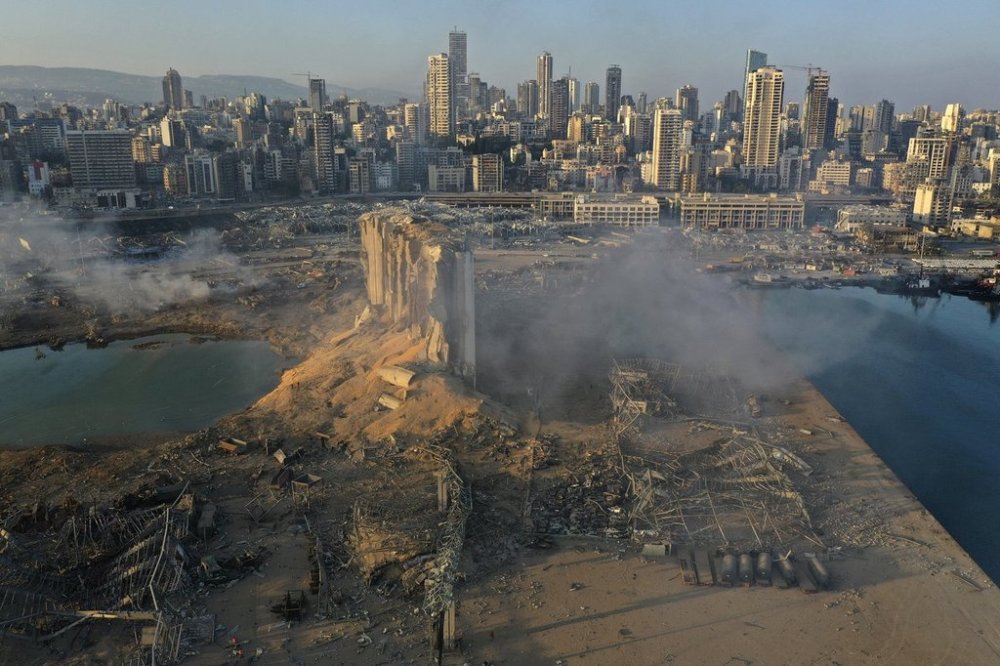Lebanese judge questions former top security chiefs over Beirut port blast
Advertisement
Read this article for free:
or
Already have an account? Log in here »
To continue reading, please subscribe:
Monthly Digital Subscription
$1 per week for 24 weeks*
- Enjoy unlimited reading on winnipegfreepress.com
- Read the E-Edition, our digital replica newspaper
- Access News Break, our award-winning app
- Play interactive puzzles
*Billed as $4.00 plus GST every four weeks. After 24 weeks, price increases to the regular rate of $19.00 plus GST every four weeks. Offer available to new and qualified returning subscribers only. Cancel any time.
Monthly Digital Subscription
$4.75/week*
- Enjoy unlimited reading on winnipegfreepress.com
- Read the E-Edition, our digital replica newspaper
- Access News Break, our award-winning app
- Play interactive puzzles
*Billed as $19 plus GST every four weeks. Cancel any time.
To continue reading, please subscribe:
Add Free Press access to your Brandon Sun subscription for only an additional
$1 for the first 4 weeks*
*Your next subscription payment will increase by $1.00 and you will be charged $16.99 plus GST for four weeks. After four weeks, your payment will increase to $23.99 plus GST every four weeks.
Read unlimited articles for free today:
or
Already have an account? Log in here »
Hey there, time traveller!
This article was published 11/04/2025 (188 days ago), so information in it may no longer be current.
BEIRUT (AP) — The Lebanese judge investigating the massive 2020 Beirut port explosion questioned two former security chiefs on Friday, including a former head of the General Security Directorate who appeared in court for the first time since being summoned nearly four years ago, according to four judicial and two security officials.
The officials spoke on condition of anonymity because they were not authorized to brief the media. The hearings mark a rare breakthrough in the long-stalled probe.
Maj. Gen. Abbas Ibrahim and former head of State Security Maj. Gen. Tony Saliba, are among several officials charged in connection with the blast that killed over 220 people. The specific charges have not been disclosed.

Ibrahim appeared in court for the first time, where Judge Tarek Bitar questioned him about the operations of the General Security Directorate during his tenure and requested related documents, which Ibrahim’s lawyer is expected to submit next week.
Ibrahim, who headed the General Security Directorate between 2011 and 2023, is known for wide connections with local, regional and international figures, including the Iran-backed militant Hezbollah group, the Syrian government and Western nations, making him a key political mediator.
Ibrahim’s attorneys said in a statement that the former General Security chief appeared in court despite having previously filed a legal challenge against Judge Bitar and despite claiming that he was immune from prosecution.
His attorneys said he appeared as a “mark of respect for the families of the martyrs and victims, his belief in justice and truth, and his commitment to upholding legal procedures and the course of justice.”
Saliba, appearing in court for the fourth time, cooperated with the hearing, providing documentation pertaining to his role at State Security. After the hearing, Saliba described the proceedings as “positive” in a statement.
On Aug. 4, 2020, hundreds of tons of ammonium nitrate detonated in a Beirut Port warehouse, killing at least 218 people, injuring more than 6,000 and devastating large swaths of the capital. The blast, one of the largest non-nuclear explosions in history, caused billions of dollars in damage and sent shockwaves through the nation’s capital.
Following years of political obstruction, Bitar resumed the stalled investigation in mid-January, questioning port and customs employees, retired military officials, the former head of port security, the former army intelligence director, and 12 witnesses.
This development coincides with significant political changes in Lebanon, including the election of Joseph Aoun as president and the appointment of Nawaf Salam as prime minister. Both are perceived as outside the traditional political establishment, which includes many figures charged in the port explosion case.
Several officials implicated in the investigation have accused Bitar of bias, refused to testify, and filed legal complaints against him.
Next week, Bitar is expected to question top former political leaders. Former Prime Minister Hassan Diab, who was in office at the time of the port explosion and is among those charged by Bitar, is scheduled to appear in court in May. His hearing will be followed by the questioning of four judges.
Meanwhile, a French delegation is expected to submit their findings from their investigation into the explosion later in April. France initiated its own probe into the explosion in 2020 after three French nationals were killed in the blast. However, French judges have faced obstacles accessing documents from the Lebanese investigation, which has been hindered by political interference.

